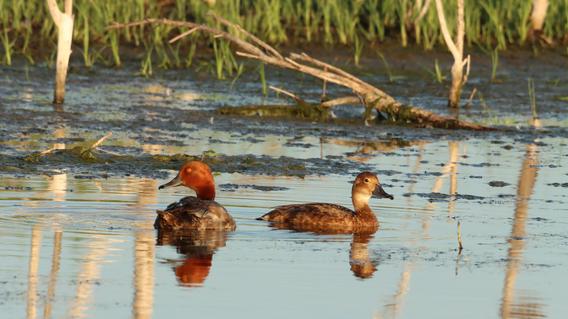
Land use & climate changes threaten spring wetland waterfowl habitats in the Prairie Pothole Region, one of the most productive waterfowl areas in North America.
Challenge: Wetland managers lack tools to assess trends in wetland changes and to develop targeted actions that preserve wetland habitats.
Principal Investigator(s):
- Owen McKenna (U.S. Geological Survey, Northern Prairie Wildlife Research Center)
Co-Investigator(s):
- Sara Vacek (US Fish & Wildlife Service)
- David Mushet (USGS Northern Prairie Wildlife Research Center)
- Josh Eash (US Fish & Wildlife Service)
Cooperator/Partner(s):
- Mike Estey (US Fish & Wildlife Service)
- Ed Meendering (Union Slough National Wildlife Refuge)
- Jennie R Skancke (Minnesota Department of Natural Resources)
The Prairie Pothole Region is recognized as one of the most productive areas for waterfowl in North America and supports an estimated 50–80 % of the continent’s duck population. This important habitat is threatened by climate change and continued land-use change. The goal of this research is to establish a framework for assessing future impacts of climate and land-use change on Prairie Pothole wetland ecosystems in Minnesota and Iowa to better assist wetland managers in planning conservation actions.
Historically, the southeast portion of the US Prairie Pothole Region in Minnesota and Iowa has faced some of the greatest challenges in wetland conservation. While advances have been made to restore these habitats, changes to water depths, species composition and water quality present direct threats to wetlands. By combining long-term monitoring and modeling with the most up-to-date climate and land-use change projections, researchers aim to present a resource to wetland managers for assessing site specific and regional changes in the hydrological functioning of critical waterfowl habitat.
Presenting managers with a range of future wetland conditions will help identify habitat gaps and areas with the greatest potential to fill these gaps. The results will be incorporated into strategic landscape planning for the acquisition, restoration, and management of wetlands in Minnesota and Iowa. The research team will bring together, work directly with, and solicit feedback from a diverse set of wetland managers throughout the research process to ensure the most effective application of these results.
Read more from the CASC Project Explorer.
Related Publications
-
Final Report: The Impact of Future Climate on Wetland Habitat in a Critical Migratory Waterfowl Corridor of the Prairie Pothole Region
- Final_Report_McKenna_March_2022.docx Download
-
Pothole Hydrology Linked Systems Simulator (PHyLiSS)
- The Pothole Hydrology-Linked Systems Simulator (PHyLiSS)—Development and Application of a Systems Model for Prairie-Pothole Wetlands External URL
- PHyLiSS v1.0.stmx Download
- PHyLiSS v1.0 example Wetland P1.stmx Download
- PHyLiSS_wiring_diagram.png Download
- Sustainability_CaseStudy_Complex_NoDrainage.stmx Download
- Sustainability_CaseStudy_Complex_Drainage.stmx Download
- Sustainability_Dynamic_Drainage.stmx Download
